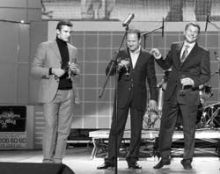There is supreme justice after all. You must agree that it would not be dignified for a country with three soccer players who have won the Golden Ball, the Oscar of soccer, if there were one, to ignore the ceremony of taking part in the world championships.
On Tuesday, Oleh Blokhin and his golden soccer ball-sharing colleagues Ihor Belanov (1986) and Andriy Shevchenko (2004), celebrated the 30th anniversary of the first Golden Soccer Ball awarded to Europe’s best player in the France football standings of 1975, after a beautiful Kyiv Dynamo soccer season. The Kyiv team was named USSR champion and won the Cup of Cups after defeating the Hungarian team Ferenzvaros and leaving fans stunned by the victory in the battle for the Supercup against Germany’s Bayern team. In fact, Blokhin owns all the personal records for Soviet soccer. He played on the Soviet national team in 112 meets (more than any other soccer players on record) and scored 47 goals. He competed in 432 games and scored 211 goals (setting another two USSR records). Five times (more frequently than any other player) he topped the list of Soviet soccer bombardiers. Fifteen times (like no other player) he was named the soccer player of the season, and in 13 (!) cases he was proclaimed the number- one player. Three times during surveys conducted by Soviet sports journalists, specifically by the popular weekly Soccer-Hockey, he was proclaimed the Soviet Union’s best soccer player (in 1973, 1974, and 1975). He held the prestigious Soviet title “Merited Master of Sport.” Today he is a true Hero of Ukraine. He also put his outstanding talents to good use as a coach, succeeding in getting Ukraine out of the “group of death” and raising the national team to world championship levels.
In fact, if not for this latest and important victory in the history of independent Ukraine, then the jubilee of the “Golden Soccer Ball” would have been a sad, nostalgic occasion. What parallels could be drawn without this triumph of the Ukrainian soccer team led by coach Blokhin? Shevchenko’s brilliant talent was clearly not enough to span the past and future. Earlier, it looked more like a cable-drawn ferry. Now it is a real bridge allowing us not only to view our soccer past proudly, but also to move forward with our heads raised high. We are all grateful to Blokhin for our sense of pride.







